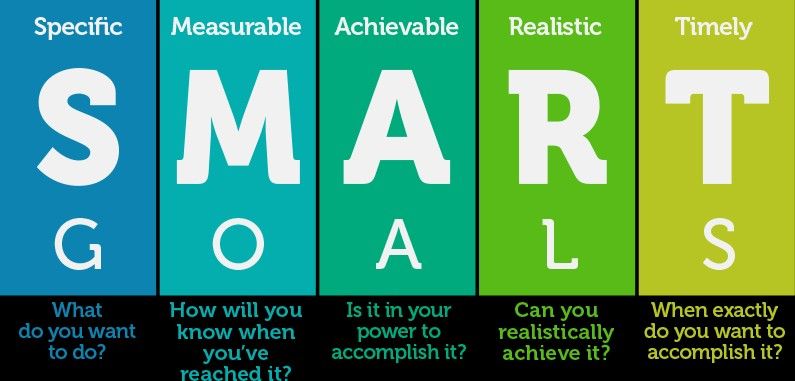Setting goals will:
- help you learn a little more about yourself
- establish a plan
- create a schedule to ensure your success in reaching your goals
It is important when setting goals that you establish short- and long-term goals.
Short-term goals will be achieved in a short amount of time…one day, a few days, a week or even a few months. For example, you are going to start exercising three times a week, or you are going to drink eight glasses of water a day, or you are going to get more sleep at night.
Long-term goals take a longer time to achieve…a year, five years or longer. I will play outdoors with my kids without feeling too tired or sore, or I will live a healthier lifestyle and work with my doctor to help reduce my medications, or I will run/walk a specific marathon.
Setting SMART goals for both your short-term and long-term goals is the most effective way of helping you stay on track with reaching your exercise and lifestyle goals.
✔Specific: Be specific about what it is you would like to achieve. Know exactly what it will look like.
✔Measurable: Know where you are now and where you want to be.
✔Achievable: What are you prepared to do reach this goal? What are you prepared to give up? Who will be part of your support system?
✔Realistic: Is your goal and your action plan realistic for you and your lifestyle? Do you have the time to follow through with the plan? Do you have the resources? If not, then adjust as necessary.
✔Timed: Set a timeline for reaching your goal and STICK TO IT.
Short-term SMART goal example:
- Specific – to be more active and eat healthier so that I can build my strength and endurance to go skating, sliding, and build snowmen and forts with my kids for 60 minutes a day on the weekends without feeling winded and tired.
- Measurable – right now I get tired after 10 minutes and sit down to watch them rather than engage in play. I currently eat frozen dinners and processed foods on most weeknights to save time.
- Achievable – I signed up and will participate in the 30-minute, online exercise program that is being offered on Tuesdays, Wednesdays and Thursdays at 8:30am. I will play outdoors with the kids on the other days. I am going to prepare dinners in advance on the weekends and start using my slow cooker to include more nourishing foods in my meals though the week. I include the children in the preparation process. On the days that they are unable or unwilling to help, I buy vegetables which are already chopped and ready to use from the grocery store. Some weekends, my friends and I get together for meal preparation day/quality time together. I am also drinking 8 glasses of water a day.
- Realistic – this program fits my schedule, is the appropriate intensity for my current fitness level, and is just the amount of time required to meet my exercise needs and goals. I have the time to prepare these meals because I stick to simple foods and recipes.
- Timed – I will reach my goal in the next 3 months.
Long-term SMART goal example:
- Specific – I want to walk 42km in less than 7hrs.
- Measurable – I currently walk 5km before I start to get tired.
- Achievable – I will participate in the 30-minute, online exercise program being offered on Tuesdays, Wednesdays, and Thursdays, as well as the 42km walking clinic program being offered online.
- Realistic – these programs fit my schedule, are appropriate intensity for my current fitness level, and are specific to my needs and goals.
- Timed – I will walk and complete the local marathon in less than 7hrs in September.
Tips for adhering to your SMART goals:
- 1) Be realistic-make gradual changes instead of all at once.
- 2) Share your goals with a friend.
- 3) Reward yourself for each goal accomplished.
- 4) Allow for slip-ups. Learn from your mistakes and move on.
- 5) Work with a qualified Health and Fitness Coach/Nutritionist.
REMEMBER…. EVERY DAY IS ANOTHER CHANCE TO GET STRONGER, TO EAT BETTER, TO LIVE HEALTHIER AND TO BE THE BEST VERSION OF YOU!
Start now!!

